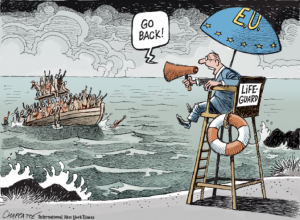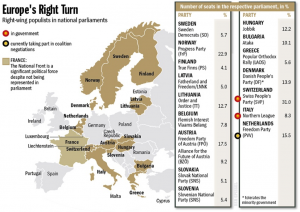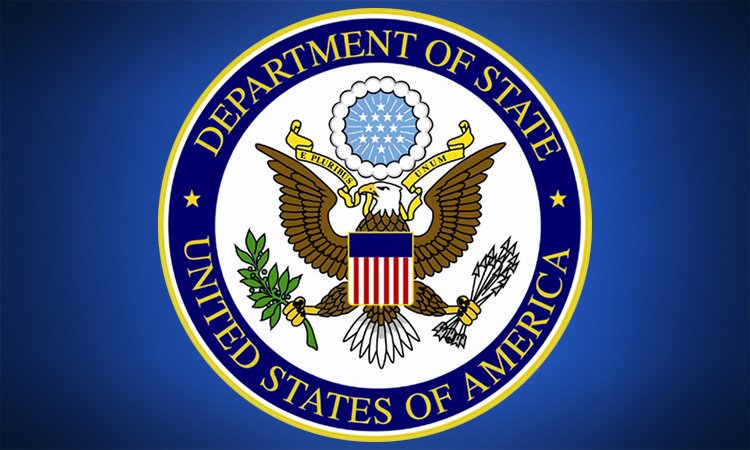August 13, 2015: As the emerald waters off the coast of Kos, a small Greek Dodecanese Island, glimmered in the iridescent sunshine, a dirtied dinghy drifted to the sandy shore, holding in it dozens of refugees, most originating from Syria. Dirtied, tired, and inundated, the passengers leapt out of the vessel–some laughing, some celebrating, some crying.
Europe has encountered numerous scenes like these as millions of refugees seek sanctuary in European countries. However, sentiments towards these immigrants are sharply polarized. Take Geert Wilders, a Dutch politician and founder of the Netherlands’ Party for Freedom (PVV), who has been indicted in a hate speech lawsuit for rousing discrimination against immigrants within his country. The Netherlands is holding federal elections in mid-March, and Wilders’ party is leading in nearly every poll. In May, France holds its presidential election, and France’s far-right party–the National Front– is deadlocked with the countries’ progressive party in pre-election polls. Marine Le Pen, the leader of the National Front, has proposed policies analogous to President Trump’s planned immigration ban, with many policies going much further.

Similar far-right parties, such as the United Kingdom Independence Party (UKIP) and the Golden Dawn in Greece, have formed in recent years, many in response to the ongoing refugee crisis as well as the growing Islamophobia in Europe. Germany, France, and even Sweden have faced a newfangled wave of far-right parties seeking seats in parliaments with solutions to these pressing European issues.
Two of the most common issues far-right parties concentrate on are immigration and terrorism. Possibly inspired by the anti-immigration and other polemic rhetoric of newly-elected U.S. President Donald Trump, far-right leaders from Austria to Slovakia place such issues near the top of their political platform. Although these anti-immigration, Muslim-fearing declamations and policies are at the forefront of far-right European parties, their claims are unsubstantiated and run contrary to established international laws.
A common argument heralded by far-right European politicians is that accepting immigrants places a considerable financial burden on a country. However, the consensus among researchers has found that immigration, specifically in Europe, improves the overall economic development of a country. A 2015 study by the Organization for Economic Cooperation and Development (OECD) found that immigrants boosted countries’ GDP by .35 percent, with little variation of this net result among countries in the study. However, the study also found that immigrants in Germany drained public funds, as many older immigrants simultaneously tapped into Germany’s pension funds. Nonetheless, the relative youth of recent immigrants will likely drive down this negative fiscal impact in coming years, according to The Economist.
Two separate studies in 2013 from University College London found that immigrants added around £2 billion to the British economy.
Additionally, Europe is facing another foreboding dilemma: their population is aging. Eurostat projects that the ratio of Europeans 65 and older to those under this age group will rise sharply in the next few decades, likely leading to a financial watershed for many European countries. Immigrants offer a simple solution to the widening ratio of senile adults to those under 65. Bloomberg Columnist Leonid Bershidsky, citing IMF and Eurostat studies, convincingly reasons that Europe, in fact, does not have enough immigrants. As migrant workers have provided Europe with labor for decades and studies from sources such as the UK’s Office for Budget Responsibility display the positive impacts of immigrants, far-right parties lack empirical or research-driven explanations for their economically argued anti-immigrant stance.
Another common platform the far-right relies on is incubating domestic terrorism anxieties after a number of terror-related attacks in Europe in the 2010s. Most notably, the 2015 Paris Attacks swept a blanketing wave of fear over Europe as an organized attack across France killed 130 and wounded nearly 400 others. Similar attacks occurred in 2016: three suicide bombers targeted the airport and a metro station in Brussels, killing 30 civilians; visa holder Mohamed Lahouaiej-Bouhle drove a cargo truck into a crowd of civilians in Nice, France during Bastille Day celebrations, killing 86 and wounding hundreds more. ISIL took credit for each of these attacks, and a number of the assailants were immigrants or temporary residents. These attacks are national security dilemmas that the far-right can justifiably point to when calling for reduced immigration, but their policy response to this predicament is illogical, rabble-roused, and based on swathing prejudices rather than observations.
Recently, Wilders has called for a ban of all Islamic symbols, a shutdown of Muslim religious buildings such as mosques, Muslim schools and asylum centers, a ban on the Koran from the Netherlands, and a ban on headscarves for women in the country. Wilder’s proposed repression of the Muslim faith is outrageous: it breaches Netherlands’ basic civil liberties of freedom of religion, speech, and expression. It is a dangerous precedent set by a far right political leader that has the potential to lead to further civil liberty violations.

As fears grow in Europe for the possibility of similar terror attacks, the far-right relies upon fear as fuel for their party platform. European politicians such as Wilders and UKIP leader Nigel Farage regularly prey upon terroristic worries, sometimes through social media platforms such as Twitter. With millions watching such infamous politicians, their rhetoric can impact perceptions and inspire similar polemic orations, even inciting violence. A recent study from California State University-San Bernardino found that anti-Muslim hate crimes in the United States rose higher in 2015 than post-September 11 anti-Muslim hate crimes rates. Notably, the study found that former President George Bushes’ public calls for tolerance of Muslims at a mosque following the September 11 attacks resulted in a sharp drop in U.S. anti-Muslim hate crimes. Most recently, the study found a stark increase in hate searches on search engines such as Google, with many netizens searching phrases such as “kill all Muslims” after President Trump’s proposed Muslim ban. Based on this study, political rhetoric impacts public perceptions. As far-right European politicians such as Wilders and Farage call for terrorism prevention through Muslim bans and immigration quotas, they are simultaneously inciting misguided hatred within their own countries.
Furthermore, the far-right’s calls to ban immigrants based solely upon religion or nationality is a violation of human rights law. Wilders has called on the EU for a blanket ban on Muslim immigrants from entering EU member states, and Farage has lauded both Trumps’ proposed Muslim ban and his more recent country-specific immigration ban. However, barring immigrants based exclusively on religion or nationality is illegal within the framework of the United Nations, as stated by UN Human Rights Chief Zeid Ra’ad al Hussein. The 1951 and 1967 United Nations Refugee Conventions (UNFC), signed by 145 parties, outlines the basic rights for refugees, which include the right to work, education, public assistance, and courts. With over 366,000 refugees travelling through the Mediterranean Sea to Europe, most fleeing war-torn Iraq, ISIL-held Syria, and Afghanistan, these refugees are guaranteed basic human rights through international law, and the far-right’s rhetorical and policy-driven condemnation of refugees as breeding grounds for dangerous terrorists is driven more by xenophobic fear than national security, not to mention the fact that that their proposed policies are illegal under UN law.
As refugees pour out of crisis-ridden countries in hopes of finding a better life, their last intention is to return to their origin country. European signatory countries of the post-WWII UNFCs agreed to protect refugees by providing them with basic unalienable rights. The far-right’s attack on refugees not only violates established UN treaties, but it also disregards the harsh reality of the situation–civilians in desperation fleeing warzones, mainly coming from the Middle East. Moreover, the consensus among researchers has found that immigrants augment Europe’s economic output, not the mention the fact that immigration is an effectual solution to Europe’s growing adult population. With Wilder, Le Pen, and other far-right party leaders up for reelection in coming month, Europe has an important choice: compassion and economic growth, or fear-driven hatred and economic status quo.


